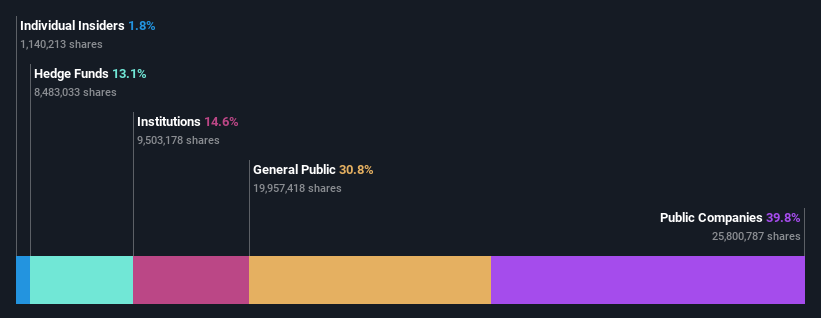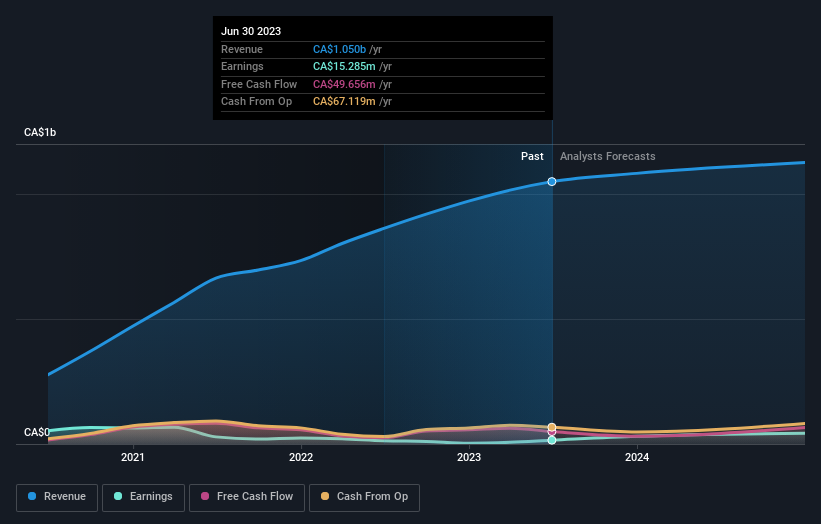Individual investors own 31% of Dexterra Group Inc. (TSE:DXT) shares but public companies control 40% of the company
Key Insights
Significant control over Dexterra Group by public companies implies that the general public has more power to influence management and governance-related decisions
A total of 2 investors have a majority stake in the company with 53% ownership
Every investor in Dexterra Group Inc. (TSE:DXT) should be aware of the most powerful shareholder groups. The group holding the most number of shares in the company, around 40% to be precise, is public companies. That is, the group stands to benefit the most if the stock rises (or lose the most if there is a downturn).
Individual investors, on the other hand, account for 31% of the company's stockholders.
In the chart below, we zoom in on the different ownership groups of Dexterra Group.
View our latest analysis for Dexterra Group
What Does The Institutional Ownership Tell Us About Dexterra Group?
Institutions typically measure themselves against a benchmark when reporting to their own investors, so they often become more enthusiastic about a stock once it's included in a major index. We would expect most companies to have some institutions on the register, especially if they are growing.
Dexterra Group already has institutions on the share registry. Indeed, they own a respectable stake in the company. This suggests some credibility amongst professional investors. But we can't rely on that fact alone since institutions make bad investments sometimes, just like everyone does. If multiple institutions change their view on a stock at the same time, you could see the share price drop fast. It's therefore worth looking at Dexterra Group's earnings history below. Of course, the future is what really matters.
It looks like hedge funds own 13% of Dexterra Group shares. That's interesting, because hedge funds can be quite active and activist. Many look for medium term catalysts that will drive the share price higher. Looking at our data, we can see that the largest shareholder is Fairfax Financial Holdings Limited with 40% of shares outstanding. Meanwhile, the second and third largest shareholders, hold 13% and 9.2%, of the shares outstanding, respectively.
After doing some more digging, we found that the top 2 shareholders collectively control more than half of the company's shares, implying that they have considerable power to influence the company's decisions.
Researching institutional ownership is a good way to gauge and filter a stock's expected performance. The same can be achieved by studying analyst sentiments. There are a reasonable number of analysts covering the stock, so it might be useful to find out their aggregate view on the future.
Insider Ownership Of Dexterra Group
The definition of company insiders can be subjective and does vary between jurisdictions. Our data reflects individual insiders, capturing board members at the very least. Management ultimately answers to the board. However, it is not uncommon for managers to be executive board members, especially if they are a founder or the CEO.
Insider ownership is positive when it signals leadership are thinking like the true owners of the company. However, high insider ownership can also give immense power to a small group within the company. This can be negative in some circumstances.
Our most recent data indicates that insiders own some shares in Dexterra Group Inc.. In their own names, insiders own CA$6.5m worth of stock in the CA$371m company. Some would say this shows alignment of interests between shareholders and the board. But it might be worth checking if those insiders have been selling.
General Public Ownership
The general public-- including retail investors -- own 31% stake in the company, and hence can't easily be ignored. While this size of ownership may not be enough to sway a policy decision in their favour, they can still make a collective impact on company policies.
Public Company Ownership
Public companies currently own 40% of Dexterra Group stock. We can't be certain but it is quite possible this is a strategic stake. The businesses may be similar, or work together.
Next Steps:
While it is well worth considering the different groups that own a company, there are other factors that are even more important. To that end, you should learn about the 2 warning signs we've spotted with Dexterra Group (including 1 which is concerning) .
If you are like me, you may want to think about whether this company will grow or shrink. Luckily, you can check this free report showing analyst forecasts for its future.
NB: Figures in this article are calculated using data from the last twelve months, which refer to the 12-month period ending on the last date of the month the financial statement is dated. This may not be consistent with full year annual report figures.
Have feedback on this article? Concerned about the content? Get in touch with us directly. Alternatively, email editorial-team (at) simplywallst.com.
This article by Simply Wall St is general in nature. We provide commentary based on historical data and analyst forecasts only using an unbiased methodology and our articles are not intended to be financial advice. It does not constitute a recommendation to buy or sell any stock, and does not take account of your objectives, or your financial situation. We aim to bring you long-term focused analysis driven by fundamental data. Note that our analysis may not factor in the latest price-sensitive company announcements or qualitative material. Simply Wall St has no position in any stocks mentioned.


